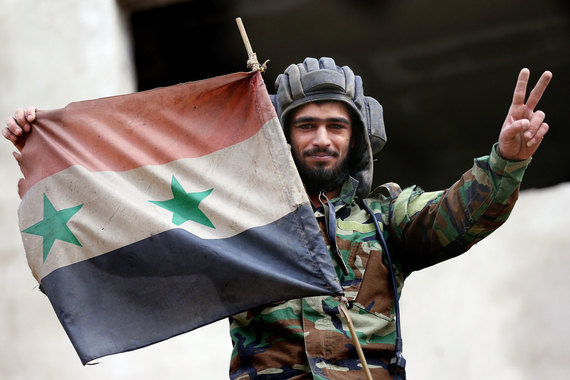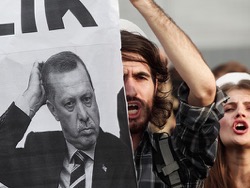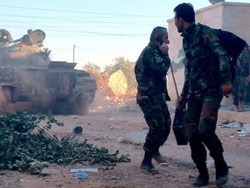
As you know, the beginning of the civil war in Syria, government troops were forced to leave the Kurdish-populated Northern parts of the country to focus on the defense of Damascus and other strategic areas. In a relatively short time the Kurds in their territories managed to create a pretty effective local governance and self-defense units.
Initially, the leaders of the Syrian Kurds tried to distance itself from inter-Arab armed conflict and to preserve, where possible, the neutrality, though, from the talks and contacts with representatives of the Central authorities and opposition shied away. But both sides of the conflict, until recently, ignored the proposals of the representatives of the Kurdish minority and didn’t want to see them on the talks in Geneva.
The world community has witnessed the heroic struggle of the Syrian Kurds against radical Islamist groups such as DAISH and “Dzhabhat EN-Nusra”. Objectively, the Kurds have found themselves on the forefront of the fight against international terrorism. During the many months of fierce fighting with jihadists the Kurds have managed not only to defend their ancestral territory, but also to take control of 800 of the 900-km Syrian-Turkish border.
Today in Northern Syria created Autonomous district “Rozhava” (Western Kurdistan), which claims the status of the Federation in the future the Syrian public education. The power of autonomy invite to cooperation of all local ethnic groups (Arabs, Assyrians, Armenians, etc.), trying to establish economic activity (agriculture, oil production, trade, etc.) to adopt regional laws and to strengthen the unity of their ranks.
And if the problem of overcoming internal party differences and develop a unified ideological and political platform would remain as vnutriserdecna case, the problem of the relationship “Rozhava” with the surrounding area and with Damascus becoming the last time paramount. Today we can say that the formation of Kurdish autonomy in Syria in a hostile environment and its future largely depends on the ability to overcome external insulation, which can easily escalate into a blockade.
The most hostile towards the Kurds is configured to Turkey. The Turkish authorities are trying to discredit the national movement of the Kurds, referred leading political force of the Syrian Kurdish democratic Union Party (DUP) — the allies prohibited in Turkey and some other countries the Kurdistan workers ‘ party (PKK), both considered terrorist organizations. Under this pretext, Ankara periodically makes missile and bomb strikes on populated by Kurds in neighbouring Syrian territory, shelling it with heavy weapons, and from 22 to 24 August 2016, the Turkish armed forces invaded the North of Syria, several mechanized columns and began to establish a so-called buffer zone. Although Erdogan has declared an official goal of this operation is the fight against DAISH (banned in Russia), in fact, the strikes have hit positions of the Kurdish militia, the border settlements. With the help of Pro-Turkish groups of the Syrian opposition (Sunni Arabs and Turkomans) had established a bridgehead on the North of Syria, separating the Kurdish cantons of Afrin and Kobani.
Complicated relationship the Kurds have formed with the external and internal Syrian opposition, with their warlords. The latter sometimes interacting with the Kurds in repelling the attacks of the jihadists, and sometimes trying to expand areas under their control at the expense of the Kurdish territories, but get a decent response. The attempts of the Kurds to achieve from opposition leaders clear answers to their questions about the place of the Kurdish minority in the future of the Syrian state to no avail. Without exception, opposition members sitting in a luxurious hotel in Riyadh, Doha, Ankara, London, Paris and Washington remain on the positions of Arab nationalism and entirely dependent on the opinions of their sponsors. Neither Arab nor Turkish or any other foreign puppeteers of the Syrian opposition do not see the need to expand the rights and freedoms of the Kurdish minority in Syria. Everyone is happy with the unresolved Kurdish issue, no one wants to guarantee the Kurds their rights in the new Constitution of the country.
Washington could exert pressure on Ankara to avoid needless casualties among Syrian Kurds, and sponsors of the armed opposition, the Kurds have taken their rightful place in the negotiation process and in the future Syrian state. However, he does not. It seems that the US administration is quite satisfied with the uncertain status of the Kurds who are trying to use the transatlantic partners to solve their uzkoegoisticheskih in Syria and the region. As expected, the Syrian Kurds have become a bargaining chip in the big game of Washington in the middle East. The US and its Western allies support the Kurds is a struggle for power in Syria, and the Americans do not hide that would like to see the Kurds in the ranks of the anti-Assad forces.
Put together the US at the end of 2015 in the North of Syria “Democratic Alliance” with the participation of Arab Sunnis, Christians and Kurds, are designed not so much to fight the jihadists, but in order to prevent the expansion of the territories controlled by the government forces in Syria. At the end of 2015 the forces of “Democratic Alliance” has been liberated from jihadist fighters of the dam and the tishrin hydroelectric power station on the Euphrates river, to the beginning of 2017, the company plans these same forces to oust the militants from the DAYS of raqqa and the place where the armed opposition groups. Thus, Washington is implementing your plan “B” for the dismemberment of Syria into separate States (Sunni, Kurdish, Pro-Turkish, Alawite, etc.).
Since the so-called “moderate” opposition and their foreign sponsors do not intend to solve the Kurdish issue in Syria, taking into account the fundamental interests of the Kurds themselves separate Kurdish leaders are seriously thinking on the intensification of contacts with Damascus. Especially considering that Damascus is today the only official government in Syria, which cannot be said about the various “opposition groups”, depending on the position of numerous foreign donors, which between them can not agree today.
Of course, much will depend on the oncoming traffic of the Central authorities.
It seems that in this case Russia could act as mediator in establishing a dialogue with the Kurds by the Assad government. After all, the Kurds demand today is not so much: the Autonomous status of their region and equal rights with the Arab majority. About such rights already available to Iraqi Kurds. The leaders of the “Rozhava” to emphasize that they are not separatists, nationalists, do not want to fight with the Arabs, and would like to live peacefully in the future Syrian state.
It appears that the establishment of relations between the Syrian Kurds and the Central government in Syria would be an important step in reducing the level of General hostility and confrontation in the country, knocked to the ground from under the feet of fans of the “warm hands” on ethnic and religious contradictions. In contrast to the external and internal Syrian opposition, which today is fragmented into hundreds of organizations and groups and bring their demands to the authorities to a common denominator is not possible, the Kurds are represented by only two main political parties (the PDS and the Kurdish national Council) and with them it is possible to negotiate.








